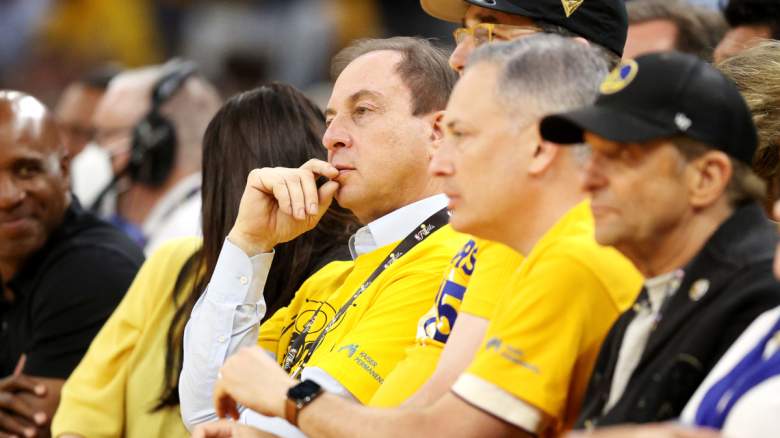
If you’re someone who deals in extremes, the Golden State Warriors are either a team that just bought another NBA championship or the victim of an unfair luxury tax system, one that is now forcing the club to let key players walk in order to get the paydays they deserve.
Clearly, Warriors owner Joe Lacob is in the latter camp.
“The hardest thing of all is navigating this luxury tax, unfortunately,” Lacob told Warriors great Andre Iguodala on the Point Forward podcast last month. “There’s a certain element out there that believes we ‘checkbook win’ …but I think it’s a very unfair system because our team is built by — all top eight players are all drafted by this team.”
Indeed, the Dubs have already lost both Gary Payton II and Otto Porter Jr this summer. And questions abound regarding the future of players like Andrew Wiggins, Jordan Poole, Klay Thompson and Draymond Green.
Lacob’s team has been forced to dole out $239 million in luxury tax payments alone over the last two years and will likely top $180 million in 2022-23, despite the fact that it has largely developed its own talent in-house. The Warriors owner believes this amounts to punishing them for doing things the right way.
Others don’t see it that way, though. And while Lacob is now railing against the current set-up — and he has some good points, too — at least one league executive doesn’t see him garnering much support among fellow owners in the argument.
Exec Dishes on Lacob’s Luxury Tax Stance
Heavy.com’s Sean Deveney spoke to a West exec about the Warriors’ tax situation and, perhaps surprisingly, they took Lacob’s side in the debate.
“He’s not wrong,” the exec said. “The problem is, if you draft really good players and you develop them the way you should, and they become stars, you can’t keep more than three of them, at most.”
According to the exec, the Dubs have been able to circumvent the rules to this point thanks to ownership’s incredible resources, which extend well beyond what most other NBA teams have at their disposal.
“They’re in a special position because of their market and now their deal with owning the building and all — they would not be able to pay as much tax if they were still at Oracle.”
The latest Golden State Warriors news straight to your inbox! Heavy on Warriors newsletter here!
Unintended Consequences & The Future
While the NBA luxury tax was put into place in order to maintain the league’s competitive balance by preventing franchises in big markets (and with bigger bank accounts) from talent raiding other clubs and building super teams, the Warriors have largely done everything by the book.
They’ve scouted well, developed their own players and — with only a handful of exceptions — they’ve won their titles thanks to the efforts of their homegrown guys.
“The idea behind the tax is to spread the talent around, but it was really designed to keep teams from overdoing it with free agents and sign-and-trades,” the exec said. “It wasn’t designed to punish you for being good at development, but that’s where they are. It’s like, ‘Are we developing these players for other teams to get them?’”
Even so, the exec doesn’t see other teams going out of their way to make life easier on Lacob and Co. during the next collective bargaining agreement negotiations.
“They can bring it up in the next CBA but they probably might not get a lot of support on it. There are not a lot of teams that are going to be sympathetic to the guys with a $200 million payroll.”
READ NEXT:


















Comments
Western Conference Exec Gets Real on Warriors’ Luxury Tax Plight